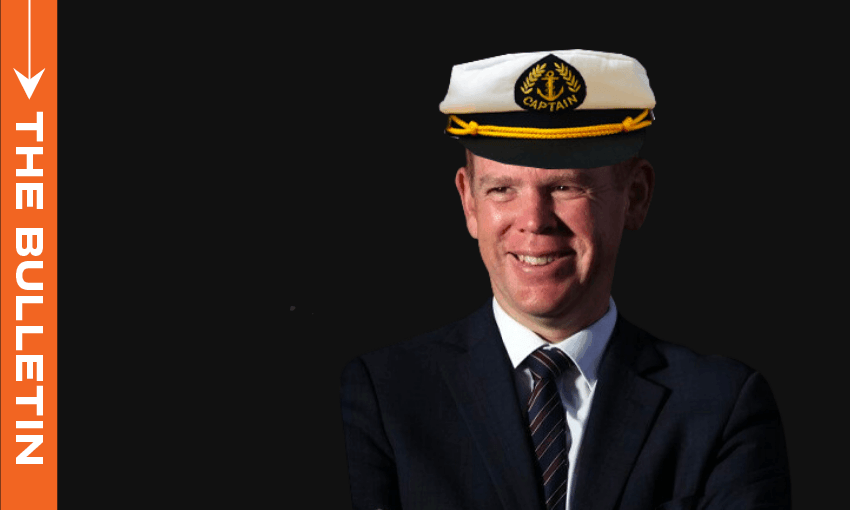Following in the footsteps of his predecessor, Chris Hipkins has ruled out capital gains and wealth taxes. With those sunk, how much territory remains for the party’s soon to be announced tax policy, asks Anna Rawhiti-Connell in this excerpt from The Bulletin, The Spinoff’s morning news round-up. To receive The Bulletin in full each weekday, sign up here.
Piketty will be disappointed
Yesterday at noon we published the first piece in a new series called the Spinoff Books Confessional. Just an hour before, prime minister Chris Hipkins had dialled in from Lithuania to say “that under a government I lead there will be no wealth or capital gains tax after the election. End of story.” It is entirely coincidental that the first person to take part in our new series was revenue minister David Parker and that the book he said he thought everyone should read was Thomas Piketty’s Capital in the 21st Century. The thesis of Piketty’s 2014 book is that the average return on capital exceeds the rate of economic growth, and without countervailing factors, inherited wealth will grow faster than earned wealth, leading to levels of economic inequality that could threaten democracy. His prescription to address this was a change in taxation policies, specifically the introduction of a wealth tax. Following the release of government research that found New Zealand’s wealthiest individuals pay less than half as much tax as “middle” New Zealand in April, described by Parker as “ground-breaking”, Piketty told the AM Show the finding that the tax system “is so regressive at the top” was “depressing”.
Hipkins robs Robertson of his Robin Hood moment
“Depressing” might be an apt description of how some would describe yesterday’s announcement, not least of all because it was prompted by the release of budget documents that showed Labour was looking at a range of new tax options. The government had planned to introduce a wealth tax in the May budget, or a tax switch as it’s been termed. Simply put it was a Robin Hood manoeuvre that would create a $10,000 tax-free threshold paid for by taxing the highest-earning individuals. In an extensive review from the Herald’s Thomas Coughlan (paywalled) of the winding road to Labour once again bottling it on tax, Coughlan notes that the policy “had the potential to blow National’s package out of the water”. Hipkins pulled the pin on it at the last minute, saying the government did not have a mandate to make such a change. Fronting on the call from his captain yesterday, launched from across the seas in Vilnius, finance minister Grant Robertson said he clearly thought these ideas had merit given the time he spent working on them. In The Post this morning, Luke Malpass writes (paywalled) that while Robertson will understand the political logic, it can not be easy for him.
Likely coalition partners sound warning, National says Labour can’t be trusted on tax
Regretfully I don’t have the word count to run back through the pros and cons of a wealth tax and why despite that, increasing tax revenue somehow, someway, is also a necessity. Forgive me for linking back to a Bulletin from March that covers that. It’s a policy Treasury is cautious about. That was reiterated again yesterday in the published advice from Treasury. “While the wealth tax is likely to meet your revenue and distributional objectives, this will come with economic and integrity costs,” it reads. It goes on to say that there are other options for meeting “revenue and distributional objectives at lower economic and integrity costs” including a capital gains tax and inheritance tax, “both of which are common in OECD countries”. At the risk of repeating myself (I’m going to anyway), I wrote in March that “I wonder if we grip onto wealth tax because it seems like the most overt way to express frustration at what many view as a growing and vastly unfair disparity, especially between generations.” That’s certainly how both the Green party and Te Pāti Māori feel. The Greens have a wealth tax central to their tax policy and Te Pāti Māori have talked about “taxing the rich”. Both parties have warned Labour that ruling out capital gains or wealth taxes could threaten their chances of a coalition deal. National has leaned back into its line that Labour can’t be trusted on tax. Stuff’s Bridie Witton interrogates that this morning.
‘Some people might call it boring…’
As Coughlan writes, “It’s not clear whether killing the tax solves many problems for Hipkins. Labour’s base is likely to be demoralised, and National will make sure that every voter knows the Greens are saying that Hipkins is in no position to rule any such tax in or out given he will almost certainly need their help to form a government.” The Herald’s Claire Trevett reports this morning that Labour is due to set out its new tax policy “within the next week or so”. The expectation is that it will focus on income tax thresholds rather than other taxes. Hipkins is already pouring water on any elevated expectations saying that “Some people might call it boring, but the times call for restraint and simple and smart policies which grow our economy, help drive inflation down and provide targeted help to those families who need it the most.” BusinessDesk’s Pattrick Smellie shares his own hunch (paywalled), writing that Labour might explore removing the GST on fruit and vegetables. It’s regarded as messy tax policy but as Smellie writes, “tax purity never won anyone an election.” He goes on to say that for “a governing party in increasingly dire need of a lift,” making food cheaper during a cost of living crisis might be a win. We’ll know soon enough whether, to quote Smellie, “Labour is going to drop the price of figs, or produce a tax policy so limp as to barely count as a fig leaf.” A damned captain’s call indeed.


